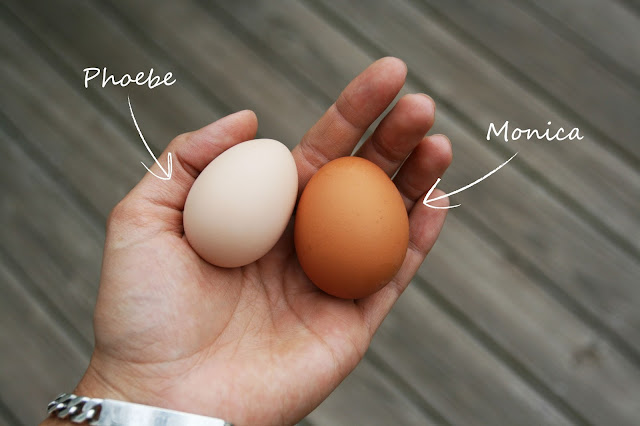What Are The Benefits of Fresh Eggs?
One of the primary reasons we started raising chickens is for the eggs. We eat eggs regularly, and it's nice to know where they come from. I know exactly what they chickens eat, and that they live without hormones or antibiotics. Additionally, it has been proven that free range eggs are arguably "healthier".
They contain:
Less Cholesterol: According to the study there was 1/3 less cholesterol in the free-range eggs.
Less Saturated Fat: Mother Earth News found 25% less saturated fat in the pastured chicken eggs. Saturated fat is a buzz word in the food world now, with reason, so anything with less is always a plus.
More Vitamin A and E: Vitamin A helps in all sorts of areas including vision, skin health, immune function, and so much more. There isn't as much information out there on Vitamin E, but I think we can assume it does have a purpose.
Extra Omega-3s: We are constantly learning more about the Omega-3s, but there has already been a lot of research pointing to benefits for people with heart concerns. Double the Omega-3s is a good thing!
Read the entire article here.
Chicken Egg Cycle
A hen's egg laying cycle is about 25 hours long, which is why they produce about an egg a day. That's amazing, especially when you compare that to a human egg cycle which is about a month! This little infographic explains why you don't need a rooster for eggs. We gave away all of our roosters because we don't want any of our egg fertilized, and they're just too noisy for our suburban environment.
A hen's egg laying cycle is about 25 hours long, which is why they produce about an egg a day. That's amazing, especially when you compare that to a human egg cycle which is about a month! This little infographic explains why you don't need a rooster for eggs. We gave away all of our roosters because we don't want any of our egg fertilized, and they're just too noisy for our suburban environment.
Where Do The Chickens Lay?
The chickens will lay where they feel they are safe, wherever that may be. We built nesting boxes into our coop, so that we can easily access eggs. The problem is that you have to train them to lay there. The first egg I found was randomly in a bit of high grass, just waiting to be stepped on. It was suggested to us to put some golf balls or ping pong balls in the the nesting boxes to give them the hint, but what I really think helped was keeping them in the run all day. It sort of forced them to start laying in the nesting boxes. Now we get two eggs in the same box daily.
How To Store Fresh Eggs
Generally, fresh eggs should be collected daily, and stored in the refrigerator for up to 6 weeks. They can stay out on the counter for a week, if you'd like to display them. Washing eggs is unnecessary and actually harmful to the eggs. Eggs are naturally equipped with a porous membrane in the shell that keeps out bad bacteria. By washing an egg, you destroy the natural protection. Eggs bought at the store are refrigerated because they have been pasteurized, and their protection gone. There is special egg wash that you can buy, but I don't feel that it's necessary. When we collect the eggs they're relatively clean (Check out the top photo). Sometimes I might knock off some straw, but other than that they don't require any cleaning.
Bad Eggs?
If you're suspicious of an egg, there is a easy test to find out whether it's still safe to eat. Place the egg in a glass of water, if it floats, it's no good, if it's sinks, fry it up!
Generally, fresh eggs should be collected daily, and stored in the refrigerator for up to 6 weeks. They can stay out on the counter for a week, if you'd like to display them. Washing eggs is unnecessary and actually harmful to the eggs. Eggs are naturally equipped with a porous membrane in the shell that keeps out bad bacteria. By washing an egg, you destroy the natural protection. Eggs bought at the store are refrigerated because they have been pasteurized, and their protection gone. There is special egg wash that you can buy, but I don't feel that it's necessary. When we collect the eggs they're relatively clean (Check out the top photo). Sometimes I might knock off some straw, but other than that they don't require any cleaning.
Bad Eggs?
If you're suspicious of an egg, there is a easy test to find out whether it's still safe to eat. Place the egg in a glass of water, if it floats, it's no good, if it's sinks, fry it up!



No comments:
Post a Comment
Note: Only a member of this blog may post a comment.